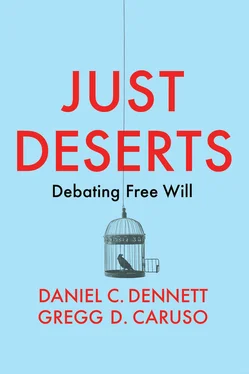Daniel C. Dennett - Just Deserts
Здесь есть возможность читать онлайн «Daniel C. Dennett - Just Deserts» — ознакомительный отрывок электронной книги совершенно бесплатно, а после прочтения отрывка купить полную версию. В некоторых случаях можно слушать аудио, скачать через торрент в формате fb2 и присутствует краткое содержание. Жанр: unrecognised, на английском языке. Описание произведения, (предисловие) а так же отзывы посетителей доступны на портале библиотеки ЛибКат.
- Название:Just Deserts
- Автор:
- Жанр:
- Год:неизвестен
- ISBN:нет данных
- Рейтинг книги:3 / 5. Голосов: 1
-
Избранное:Добавить в избранное
- Отзывы:
-
Ваша оценка:
- 60
- 1
- 2
- 3
- 4
- 5
Just Deserts: краткое содержание, описание и аннотация
Предлагаем к чтению аннотацию, описание, краткое содержание или предисловие (зависит от того, что написал сам автор книги «Just Deserts»). Если вы не нашли необходимую информацию о книге — напишите в комментариях, мы постараемся отыскать её.
Just Deserts
truly deserving
Just Deserts
Just Deserts — читать онлайн ознакомительный отрывок
Ниже представлен текст книги, разбитый по страницам. Система сохранения места последней прочитанной страницы, позволяет с удобством читать онлайн бесплатно книгу «Just Deserts», без необходимости каждый раз заново искать на чём Вы остановились. Поставьте закладку, и сможете в любой момент перейти на страницу, на которой закончили чтение.
Интервал:
Закладка:
In effect, you are stuck on the wrong side of a sorites puzzle: if I am born without moral responsibility, utterly dependent on the luck of genes and environment, then how can adding a smidgen of competence ever lead me to be responsible? Two grains of sand are not a pile or heap ( sorites , in Greek), and adding another does not make a pile. When is there enough sand to make a pile? When does a man lose enough hair to be bald? The gradual accumulation of the grounds for being held responsible, and holding oneself responsible, has no natural moment when “a bell rings” and you acquire free will, but we have devised defensible and adjustable thresholds that measure what matters. Since the benefits of political freedom in a well-governed state are so great, most people aspire to moral competency, and for good reasons. And when they screw up, they would rather be punished than institutionalized as morally incompetent. “Thanks, I needed that!”
Caruso:I don’t doubt that the sense of “desert” you defend is the everyday sense. Keep in mind, though, that it is exactly this sense of desert that is used to justify retributivism. And nothing you have said suggests that you reject either of the two main tenets of retributivism – its backward-looking-ness (at least internal to the moral responsibility system) and its appeal to just deserts. Quite the opposite, you explicitly state that the premeditated murderer really does “deserve to go to prison for a very long time,” irrespective of future consequences in specific instances. I’m confused, then, why you continue to deny that you are a retributivist. It seems to me that your view is indistinguishable from retributivism. Yes, you support sentence reform and eliminating the death penalty, but that doesn’t make you a non-retributivist. But rather than get into a debate over your membership in the Retributivist Party, I think it would be more helpful to focus on specifics.
I disagree with you that people deserve to be praised and blamed in the everyday cases you discuss. Consider the case of Albert Einstein. He too was a free will skeptic who believed that his scientific accomplishments were not of his own making. In a 1929 interview in The Saturday Evening Post , he said: “I do not believe in free will … I believe with Schopenhauer: we can do what we wish, but we can only wish what we must.” He goes on to add: “My own career was undoubtedly determined, not by my own will but by various factors over which I have no control.” He concludes by rejecting the idea that he deserves praise or credit for his scientific achievements: “I claim credit for nothing. Everything is determined, the beginning as well as the end, by forces over which we have no control.” (Side note: my own free will skepticism is agnostic about determinism. I maintain that whether or not the universe is governed by deterministic laws, Einstein’s general point remains true, since indeterminate events are no more within our control than determined ones. This is why, following my friend and sometimes-collaborator Derk Pereboom, I call myself a hard-incompatibilist rather than a hard-determinist .)
Of course, we can attribute various accomplishments to Einstein – free will skepticism is perfectly consistent with attributability. We can also say that Einstein was extremely intelligent, gifted, and creative. What we cannot say, if we are free will skeptics, is that Einstein deserves praise (in the “basic-desert” sense) for his attributes and accomplishments.
I know this sounds counterintuitive, but that’s only because internal to the moral responsibility system , desert-based praise and blame, punishment and reward come naturally. The problem with appealing to our everyday practices, however, is that it takes for granted the very thing in need of justification. To paraphrase my friend and fellow skeptic Bruce Waller, if we start from the assumption of the moral responsibility system, then the denial of moral responsibility is absurd and self-defeating. But the universal denial of moral responsibility does not start from the assumption that under normal circumstances we are morally responsible, and it does not proceed from that starting point to enlarge and extend the range of excuses to cover everyone (so that everyone is profoundly flawed). That is indeed a path to absurdity. Rather, those who reject moral responsibility reject the basic system which starts from the assumption that all minimally competent persons are morally responsible. For the free will skeptic, it is never fair to treat anyone as morally responsible, no matter how reasonable, competent, self-efficacious, strong-willed and clear-sighted that person may be. Since skeptics like myself, who globally challenge moral responsibility, do not accept the rules of that system, it is question-begging to assume our ordinary moral responsibility practices are justified without refuting the various arguments for global skepticism.
Now, in fairness, you do provide a forward-looking justification for backward-looking blame and punishment. That is, you argue that the whole moral responsibility system is justified in terms of its forward-looking benefits, but once we adopt the “system of desert” we need to reject case-by-case judgments of what would produce the best outcomes. Internal to the system , you maintain, we need to adopt backward-looking, desert-based practices and policies. But I see at least two problems with this. First, it’s an open question whether the moral responsibility system has the forward-looking benefits you maintain. The notion of just deserts , for instance, is too often used to justify punitive excess in criminal justice, to encourage treating people in severe and demeaning ways, and to excuse and perpetuate social and economic inequalities. Additionally, resentment, indignation, moral anger, and blame are often counterproductive on the interpersonal level when it comes to the goals of safety, moral formation, and reconciliation.
Rather than argue the point further here, however, I will simply note that it remains an empirical question whether, on balance, we would be better off without a system of desert. I believe we would be. My second concern is that blame and punishment, especially legal punishment, can cause severe harm. If you want to justify the harm caused by blame and punishment on the assumption that agents are free and morally responsible, hence justly deserve to suffer for the wrongs they have done, then it would seem you need good epistemic reasons for thinking agents actually are free and morally responsible in the sense required. But I don’t see how a pragmatic or consequentialist justification of the “whole system of desert” can provide such a justification. Pointing to the benefits of adopting a system of desert seems orthogonal to the core question.
Lastly, regarding luck, I go further than Nagel, and maintain that every morally significant act is either constitutively lucky, presently lucky, or both. Your antidote to luck seems to be skill or moral competency. But, as I argued earlier, the series of actions through which agents develop various skills and competencies are themselves either the result of constitutive luck (when they stem from an agent’s endowments), present luck, or both.
Dennett:You find my view “indistinguishable from retributivism.” This baffles me, since I have all along stressed the “forward-looking” justification I have presented. There are non-retributive, non-deontological, consequentialist justifications of punishment. See, for instance, the excellent entry on punishment in the Stanford Encyclopedia of Philosophy by my late friend and colleague Hugo Bedau (2015). The “liberal justification” of punishment he offers there is one with which I, along with many others, concur. As Bedau notes, after making a proper hash of retributivism: “But the basic insights of retributivism cannot be merely brushed aside. There is a role for desert in a liberal theory of punishment, but its scope needs careful restriction.”
Читать дальшеИнтервал:
Закладка:
Похожие книги на «Just Deserts»
Представляем Вашему вниманию похожие книги на «Just Deserts» списком для выбора. Мы отобрали схожую по названию и смыслу литературу в надежде предоставить читателям больше вариантов отыскать новые, интересные, ещё непрочитанные произведения.
Обсуждение, отзывы о книге «Just Deserts» и просто собственные мнения читателей. Оставьте ваши комментарии, напишите, что Вы думаете о произведении, его смысле или главных героях. Укажите что конкретно понравилось, а что нет, и почему Вы так считаете.












